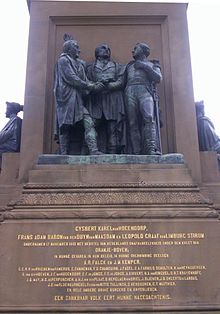The Triumvirate of 1813 (Driemanschap van 1813), or the Provisional Government, governed the Netherlands briefly at the end of the Napoleonic era, before William I of the Netherlands came to the throne. It consisted of Gijsbert Karel van Hogendorp, Frans Adam van der Duyn van Maasdam and Leopold van Limburg Stirum.[1][2]

History
The Triumvirate of 1813 was formed on 17 November 1813, after the French governor Charles-François Lebrun and a significant part of the French troops hurriedy left the area of the Dutch departments, which later became the Netherlands, leaving it without a government.[3][4] The withdrawal of French forces was the result of Napoleon's disastrous campaign against Russia, his defeat at the Battle of Leipzig (also called the Battle of the Nations) and the subsequent push back of French forces into France by the forces of the Sixth Coalition.
This Triumvirate issued a proclamation in The Hague on 20 November 1813 in which it took charge of the general government and declared that the Netherlands was free from French rule.[5] The next day a proclamation followed in which a Sovereign Principality of the United Netherlands was proclaimed, with the announcement that there was a General Government of the United Netherlands, in the name of the Prince of Orange, and that all compatriots were released from their oath of allegiance to the French Emperor.[6]
On 21 November, Reinhard Falck was appointed general secretary of the Provisional Government. Before he arrived from Amsterdam on November 29, François Daniël Changuion served as general secretary.[7]
The three statesmen invited by letter the almost forgotten Prince William Frederick of Orange-Nassau, the later King William I of the Netherlands, to come to The Hague and take over the government as "sovereign prince". The purpose of this was to prevent anarchy, or a possible annexation of the Netherlands by Prussia or England.[8]
William accepted the invitation of the Triumvirate and an English frigate took him to the coast of Scheveningen where he set foot on Dutch soil on 30 November 1813. On 1 December, William was proclaimed sovereign prince, which he accepted on 2 December 1813. Four days later, on 6 December 1813, having completed its objective, he disestablished the Triumvirate and took over the government of the country. International recognition of William Frederick as monarch and the first King of the Netherlands, only came about at the Congress of Vienna in 1815.[9][10]
References
External links
 Media related to Triumvirate of 1813 (Netherlands) at Wikimedia Commons
Media related to Triumvirate of 1813 (Netherlands) at Wikimedia Commons
